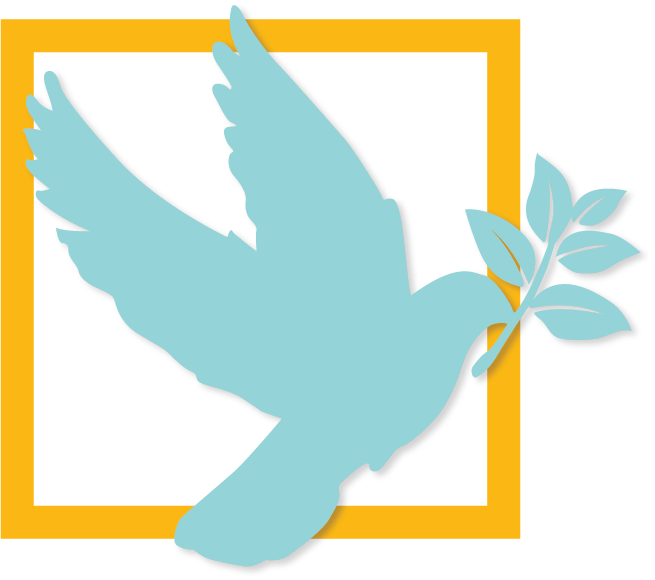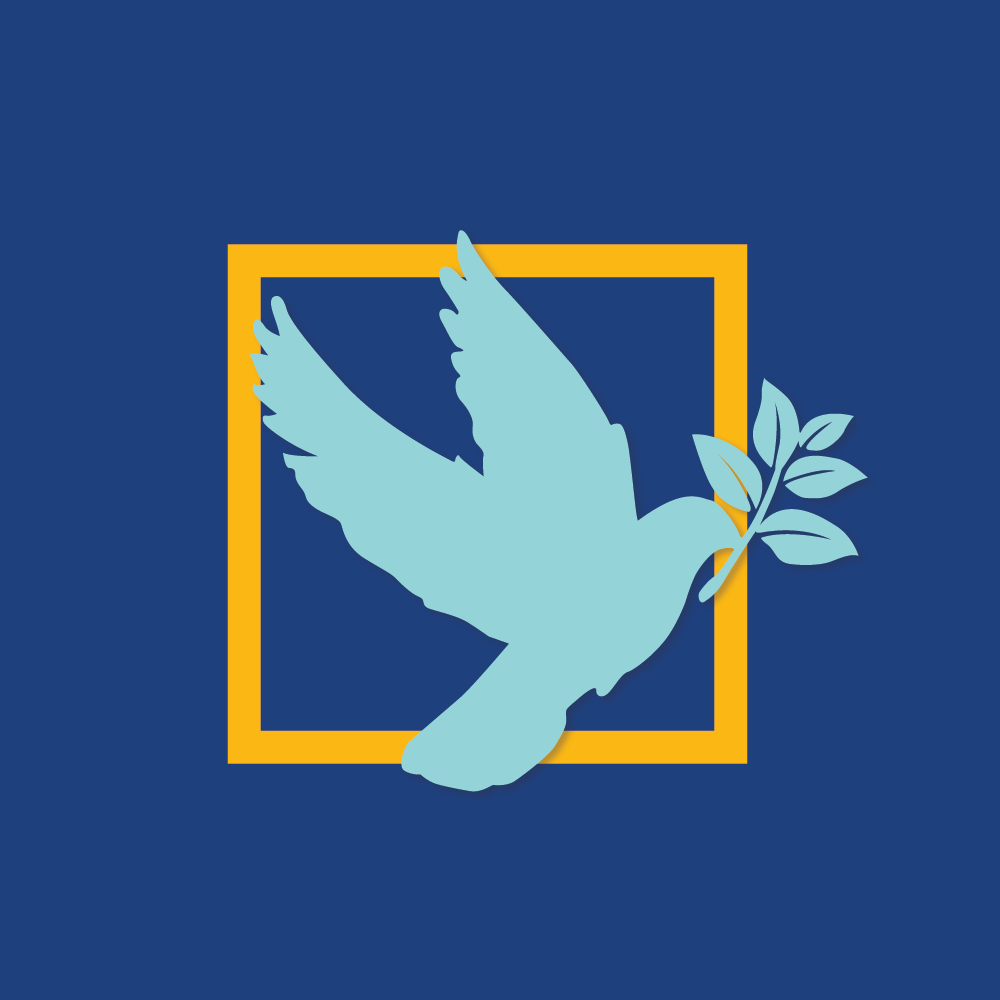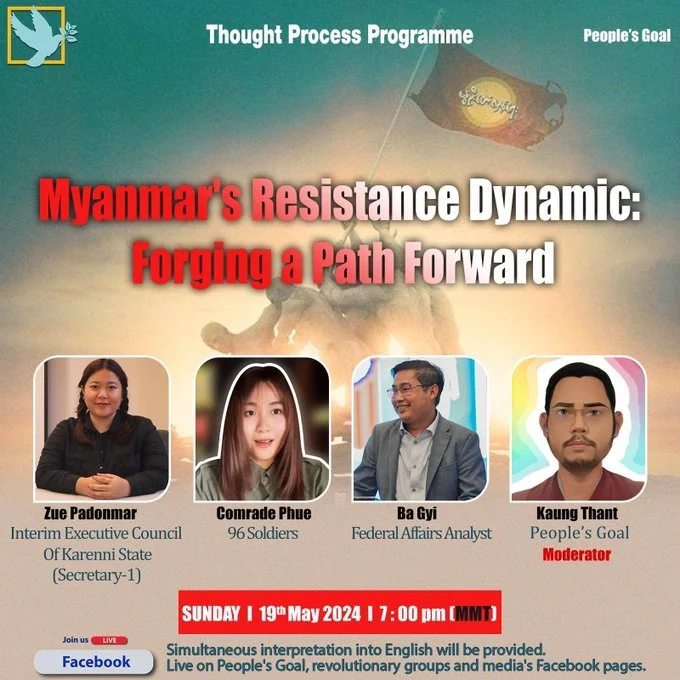PEOPLE’S GOAL DISCUSSION: MYANMAR’S RESISTANCE DYANMIC
Q. What is the current dynamic in the revolution in its third year? It has been criticized for not achieving victory yet. Can this damage the revolution?
Zue Padonmar (Interim Executive Council of Karenni State, Secretary 1): From the Karenni perspective, we launched many operations to control more areas in Kayeni State. These have greatly increased Karenni territories and local administrative structures have spread.
I welcome criticism of the revolution for not having been successful yet. When people criticize the revolution, it means they are still interested in it. Revolutionary stakeholders are human beings, so of course mistakes will be made. There must be room for criticism; indeed, people should be encouraged to criticize. The situation is not normal. So many people have lost loved ones. Basic human needs are not met for millions of IDPs. When people are in danger and their needs are not met, of course, they will have things to criticize about the revolutionary government.
Though the people will criticize, we have limited capacity to respond to them. However, we have developed platforms to facilitate filing complaints against the revolutionary government. To respond to criticism, we need more resources. This is certainly a weakness. Infrastructure, in general, is a weakness in Myanmar. Many people have a very clear picture of what is wrong on the ground, but there are not enough resources to respond and implement changes.
Criticism will not damage the revolution. In its three years, the people have supported and criticized it simultaneously. The revolution will only be damaged when the people stop supporting it. Criticism is healthy and productive.
Ba Gyi (Federal Affairs Analyst): The more we can use criticism and feedback, the stronger the revolution will become. When the coup began, the people reflected on how their democratic system had been stolen from them. They protested, and people gave as much as they could afford to support the revolution.
The grassroots community understands that a democratic system can only succeed once the military dictatorship is eradicated. They have been carrying on this battle for decades. In the last three years, the revolution has gone through many stages and had many needs. For example, there are needs on the ground in the armed revolution. There is also much work to be done in theory and system building, particularly the federal system. The NUG is a government set up to manage the revolution's activities. It is essential for them to be as attuned as possible to the people's desires and needs and to adapt the revolution accordingly. There are so many PDFs, and the reason they exist is because the people support them. The number one priority is to defeat the military dictatorship. Criticism of the revolution's policies and actions will not undermine it. They will only strengthen it.
Q. You are a revolutionary in the field. Can you comment on weaknesses you have observed?
Comrade Phue (96 Soldiers): Territorial control has increased immensely, although there have been some frictions between various armed groups. Internal fighting is certainly not good for the revolution. The junta will take advantage of such weaknesses.
In upper Myanmar, eight out of ten villages have been burned down. People have lost everything. Yet, they still support the revolution. These people, who have sacrificed so much, should not see revolutionary groups fighting with each other. They deserve better. To prevent this issue, there needs to be stronger policies and implementation uniting local defense forces.
Often, administrators and ministers do not know exactly what is happening on the ground. For example, one defense force is carrying out its operations successfully, but it encounters another defense force that will not allow it to work within a given territory as a matter of principle. However, it would be better if these groups could work together. The details of these dynamics must be understood when formulating new policies and implementing them in the field.
Q. How can we overcome the revolution's challenges?
Zue Padonmar: We need increased research about what is happening on the ground and more robust theoretical frameworks, particularly for the developing federal system. We need to feed the people day by day. We must try to keep the people safe by establishing functioning townships. Without security, people become tired. We must see our problems clearly. For example, to establish a federal democracy, we must clearly see that the main thing in the way is the military's interference in politics. We must clearly see that this is an essential problem, and not one to be compromised, which is what some in the international suggest, because they simply do not understand the fundamental problem historically.
We need a new constitution that guarantees equality between ethnic groups. It must also enshrine equality for women. All of us are responsible for seeing our essential changes through. The NUG, NUCC, and CRPH have immense responsibilities and they should be held accountable, but all of us involved in the revolution must hold ourselves accountable too.
Q. Can you remark on the Interim Executive Council (IEC) in Karenni?
Zue Padonmar: There is enough rice in Karenni State, but because of the airstrikes, it can no longer be cultivated as before, and since the infrastructure is ruined, rice cannot be imported. Therefore, to rehabilitate local agriculture, we need funds to carry out training programs and buy materials. Moreover, the rule of law suffers because there is no money to pay police officer's salaries. The needs of the IEC are mostly financial.
Q. Who is responsible for making the necessary changes?
Ba Gyi: The revolution belongs to the people, and the federal democratic charter has given a sound framework. The NUG and CRPH take the lead, structurally, so, of course, they have a lot of responsibility. But all of us must continue being engaged. All the people protesting, fighting, and supporting the revolution must be coordinated and given the chance to contribute.
The NUCC is not merely an advising body for the NUG; it must take the lead in forging the new direction after the SAC is gone. Structuring the revolution is vital.
The NUG must act as a revolutionary government, not a peacetime government. It should work accordingly, with urgency. It must also expand public participation in the political process. They must also be able to give clear messages to the international community, explaining the role of local governments, EROs, etc.
Comrade Phue: We cannot blame the revolutionary government for all our problems. The nature of the revolution's issues can be reduced to clashes of ego. Those who bear arms should do so only to defeat the military dictatorship in solidarity. The NUG should, therefore, work harder to coordinate between and harmonize different defense forces so that they do not get bogged down in petty disputes.


